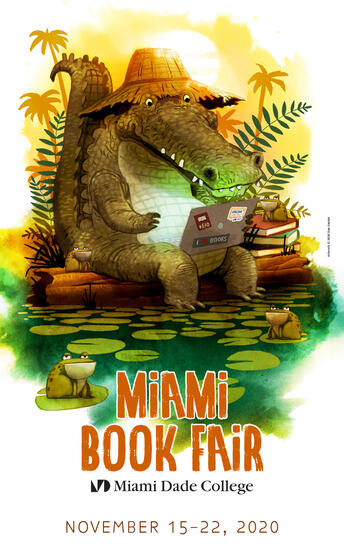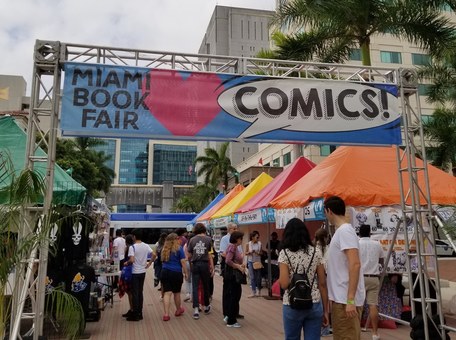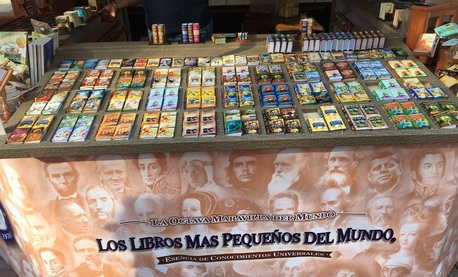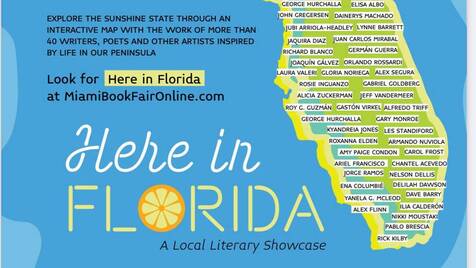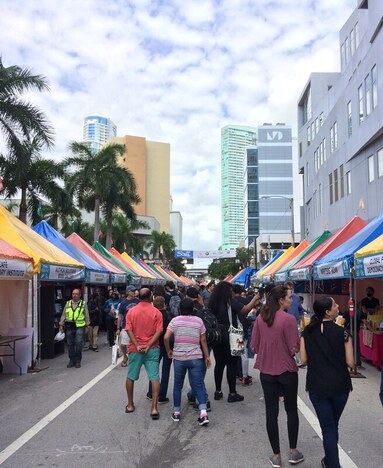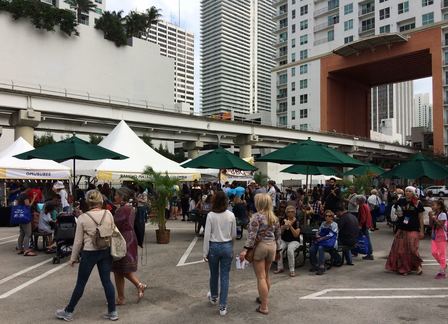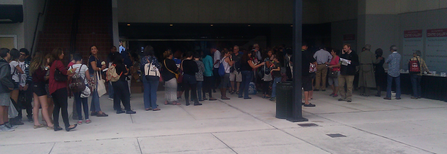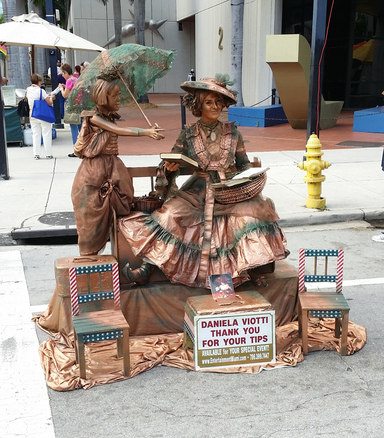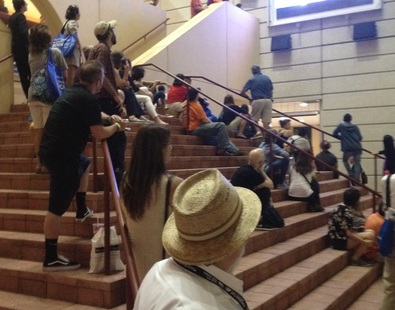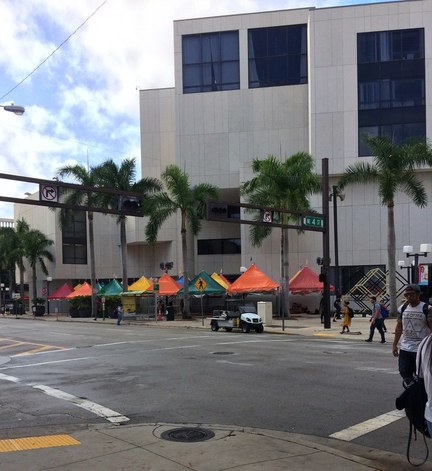Miami Book Fair 2020 Blog
2020: The Miami Book Fair Online
EDITOR'S NOTE: Photos from past FBR Miami Book Fair live-blogs are here to give you a sense of what the in-person experience has been like.
In addition, some links to panels may no longer be functional. You can still get a sense of what panels were like from our coverage below. Sunday, Nov. 22, 2020
Sunday, Nov. 22, 2020, 5:30 PM
The online Miami Book Fair is not the same. Things I miss: ◇ The crowds enjoying the street fair and running into friends at many a turn. ◇ Arriving really early, strolling the uncrowded fair, and chatting with vendors setting up their booths. ◇ Excellent three-author panels where I impulse-buy all three books and get them signed. ◇ Holiday shopping at the used-and-antiquarian booksellers. ◇ The Porch, where anything can be happening. ◇ The Friends of the Fair lounge with its always warm welcome. ◇ A quick restorative at the Biscayne Bay Brewing stand. ◇ Arepas (don’t tell my cholesterol coach). Then again, something marvelous has happened this year: No more angst and frustration when two (and often more) sessions I want to see are overlapping or simultaneous. I’ve viewed twice the number of sessions that I usually make in person, and been able to enjoy more variety. Still have a dozen more that I plan to watch. Untold riches for me, and people around the world can enjoy the richness of MBF. —Bob Morison Sunday, Nov. 22, 2020, 4:00 PM
To say 2020 has been different is an understatement. In the U.S. alone, the pandemic has cost the lives of hundreds of thousands, the jobs of millions, and forced others to work and study from home. Large-scale events have been outright cancelled or have adapted and transitioned to a virtual space. Even with all that has happened, and what is still to come, it's good to know that the Miami Book Fair, albeit remotely, can remain one constant in this time of COVID. I love the Miami Book Fair in person—I mainly miss it for the food, to be honest—but every year I do lament my inability to be in two places at once and having to sacrifice one panel over another or skip a panel to have lunch. With MBF Online, I enjoyed having the option of viewing panels that were released at the same time and not worry that I needed to pick and choose. I hope that by this time next year, we can safely gather in Downtown Miami for another Miami Book Fair, and keep some of the online elements introduced this year. But until then, watch MBF Online! Stay safe and sane! —Giselda Aguiar Sunday, Nov. 22, 2020, 3:00 PM
Poet Campbell McGrath, whose latest most excellent book is Nouns and Verbs: New and Collected Poems, did yeoman service to this year’s Book Fair online. He conducted conversations with four U.S. Poets Laureate, including Joy Harjo, the current and first Native American Laureate. She described the role of poetry among the Native Nations long before Europeans arrived and discussed her crossover activities as poet and musician. Her new anthology is When the Light of the World was Subdued, Our Songs Came Through: A Norton Anthology of Native Nations Poetry. The past Laureate discussions are with Juan Felipe Herrera, Robert Haas, and Billy Collins. To put the Laureateship in context, McGrath also interviewed Dr. Carla Hayden, the Librarian of Congress (and the first professional librarian in 60 years to hold the post), and Robert Casper, who directs the Library’s office of poetry and literary affairs. They discussed the Laureate roles and selection process. Finally, McGrath talked with Kevin Young about his new and definitive anthology, African American Poetry: 250 Years of Struggle & Song, which Young describes as “a long conversation among poets.” They discussed how “putting pen to paper can be an act of protest,” the historical connections between Black music and poetry, and the vibrant contemporary Black poetry scene. —Bob Morison Sunday, Nov. 22, 2020, 2:14 PM
This is not your typical Book Fair present-the-book session. More like eavesdropping on the conversation of two people who didn’t know each other but have a lot of common interests and experiences. The occasion is Paul Theroux’s On the Plain of Snakes: A Mexican Journey, for which he drove the length of the U.S.-Mexican border. His interlocutor is novelist (The House of Broken Angels) and Tijuana native Luis Alberto Urrea. They talked about the richness of Mexican culture, the unique culture along the border, and how little Americans know of it. Very little Mexican literature is translated into English, but Mexicans read a lot of American work in translation. Some people are in the know—Mexico is the most popular destination for American expats [currently about 1.5 million, just looked it up]. And yet politicians demonize the neighbor next door, a neighbor “on the same road," as Theroux says. A few travelogue points came up. Road trips in Mexico are fun—there’s always a great place to eat and friendly place to stay. Mexicali has the largest selection of El Chapo t-shirts. The enlightening and enjoyable conversation ends with each describing an upcoming book and the two making arrangements to stay in touch. Replay is here. —Bob Morison Sunday, Nov. 22, 2020, 12:40 PM
M.T. Anderson's The Daughters of Ys retells, in graphic novel format, the story of the mythical city of Ys and how it sunk under the sea. Gabby Rivera's b.b. Free tells the story of b.b. in a post-plague world in which some people want to bring back the old ways of hierarchical power. Lisa Brown's The Phantom Twin is about a sister who is haunted by her deceased conjoined twin. The "Strange and Striking Fantasy" panel's moderator, Heidi MacDonald, wrapped the discussion by asking each author what their journey was transitioning from one art form—prose writing in the case of Rivera and Anderson and only illustrating in Brown's case—to graphic novels. Anderson and Rivera gushed over their collaborators who drew their stories, Brown adding that she was jealous since she was her own illustrator. The panel ended with each artist discussing their future projects. Watch the fun convo here. —Giselda Aguiar Sunday, Nov. 22, 2020, 12:00 PM
The "Strange and Striking Fantasy" panel features M.T. Anderson (The Daughters of Ys), Gabby Rivera (b.b. Free), and Lisa Brown (The Phantom Twin). Moderator Heidi MacDonald started the conversation with Rivera, whose book, which came out in 2019, is set 100 years after a plague. They joked that Rivera had prophetic powers. All three books deal with discrimination or othering in one way or another, prompting MacDonald to ask, "Why does society blame the girls?" Rivera poignantly stated that if people in power admitted to and accepted the ugly truths, it would allow for healing. —Giselda Aguiar Saturday, Nov. 21, 2020
Saturday, Nov. 21, 2020, 5:00 PM
I became interested in "The Darkness Comes—The Horror of Noir" panel when, at the virtual kick-off event the Miami Book Fair had this year on October 8th, one of the MBF staffers recommended Katie Skelly's graphic novel Maids about the Papin sisters. Knowing the story and loving graphic novels, I wanted to hear more. The panel consisted of Ed Brubaker, Julia Gfrörer, and Skelly with Alex Segura (Black Ghost) as moderator. Brubaker's Cruel Summer tells a multi-generational crime story about criminals and their children who seem to be going down the same path. Gfrörer's Vision: Book 1 is essentially a ghost story of a 19th-century spinster and her relationship with a haunted mirror. Skelly's Maids tells the story of the Papin sisters who murdered the family they were maids to in 1930s France and their subsequent arrest and trial. The authors started off talking about noir and what makes noir, almost a continuation of the conversation in the "Miami Noir: The Classics" panel. Eventually the discussion covered how/why they chose to tell their stories as graphic novels, what they're reading now, and what are their next projects. Watch their full discussion here. —Giselda Aguiar Saturday, Nov. 21, 2020, 4:00 PM
One interesting topic discussed at the "Bigotry as a Monster: Black Heroes Beyond the Black Panther" panel was the state of comics today. Brandon Thomas (Excellence) spoke about the need of structural changes, mentioning the DC Future State, and single issue/20-page vs. "bumper editions" with two or three issues. "I feel like this 20-page pamphlet style is going to ultimately be the death of us," Thomas said. "I think that's why you're seeing a lot of movement, now, with original graphic novels." As someone who doesn't read comics often and prefers graphic novels, I found the entire conversation fascinating, getting a glimpse behind the curtain of the comic industry, including corporate vs. indie, and hearing these artists' views on the current climate within the industry. Watch four friends and collaborators talk about comics and beyond here. —Giselda Aguiar Saturday, Nov. 21, 2020, 3:00 PM
"Bigotry as a Monster: Black Heroes Beyond the Black Panther" was moderated by Khary Randolph, although he stated he wouldn't be moderating but having a conversation with authors David F. Walker (Bitter Roots series), Kwanza Osajeyfo (Widows and Orphans), and Brandon Thomas (Excellence), who was in the "Love, Commerce, War: Sci-Fi Adventure Thrillers" panel yesterday. The conversation started with Randolph asking, "How are y'all feeling about 2020?" "2020 has been living to its expectations because there haven't been any," Osajeyfo said, laughing. "If the bar is this low, I'm just going to step over it and keep going." Thomas added he sometimes feels "survivor's guilt" because he's doing well with so many offers to write comics coming in, alluding to a 10-year span in which he wasn't allowed to write for DC. (He didn't elaborate, much to the teasing of his co-panelists who asked to be told after the panel.) —Giselda Aguiar Saturday, Nov. 21, 2020, 2:00 PM
The “Maria, Maria: Hurricane Stories” session, part of the Book Fair’s “Read Caribbean” track, is a twofer. In the first and longer segment, M.J. Fievre, prolific author in French and English and the Read Caribbean coordinator, interviews journalist Maria Padilla and clinical social worker (and retired NYPD sergeant) Nancy Rosado, authors of Tossed to the Wind: Stories of Hurricane Maria Survivors. They described the ravages of Hurricane Maria when it traversed Puerto Rico, the failures of government preparation and response, and people's prolonged and painful recovery. “People can prepare for two weeks without electricity and other services—but not for a year.” The book's firsthand stories come from Puerto Ricans who evacuated to the Orlando area, where they faced a different set of difficulties, met with the combination of resilience and community. Padilla and Rosado felt they needed to document the hurricane experience before it's forgotten, and their passion for the project is inspiring. In the second segment, novelist and poet Geoffrey Philp interviews poet Celia Alexandra Sorhaindo, originally from Dominica, West Indies, and novelist Kereen Getten, originally from from Jamaica. Sorhaindo’s collection, Guabancex, is named after the supreme storm deity of the ancient Florida-and-Caribbean Tiano people. She said the poems mix “maelstrom and radiance, myth and reality.” Getten’s book for early readers, When Life Gives You Mangoes, centers around a young girl who has lost memory of the previous year, when a hurricane had hit. They discussed the Caribbean as a crucible, a melting pot of multi-cultural variety with, once again, resilience and community as the common ingredients. The replay is here. —Bob Morison Saturday, Nov. 21, 2020, 1:00 PM
The "Rick Riordan Presents" panels features J.C. Cervantes (Storm Runner #3: The Shadow Crosser), Kwame Mbalia (Tristan Strong Destroys the World), and Tehlor Kay Mejia (Paola Santiago and the River of Tears) with Dr. Keshia Abraham as moderator. Mejia's middle grade book is inspired by la llorona myth. Cervantes' Storm Runner series is based on Mayan mythology. Mbalia's Tristan Strong series depicts a world in which African American folk tales coexist with west and south African mythology. This is one of the funniest, sincerest, and thought-provoking panels I've seen so far. It'll make you want to stop and just listen. Some topics covered: ◇ Diaspora, identity, and assimilation ◇ Borders, both physical and metaphysical ◇ The power of anger (reminding me of Audre Lorde) and processing emotion ◇ The use of humor ◇ Shame The panel ended with each author reading a part of their novels. Watch it all here. —Giselda Aguiar Saturday, Nov. 21, 2020, 12:00 PM
Valerie Strauss and Roxanna Elden begin their "In Conversation" by discussing Elden's first book, See Me After Class: Advice for Teachers by Teachers (2009), which was a work of nonfiction, as opposed to her latest book, Adequate Yearly Progress, a novel about teachers. Elden's personal journey as a teacher leads to a brief discussion of the myth of the "Super Teacher." (Watch Elden's presentation on the myth here.) Trigger warning: Elden and Strauss discuss cockroaches at one point. Elden brought up the fact that during NaNoWriMo in November, she would encourage students to participate by giving them extra credit and free food. The year she was my teacher, those of us who participated ate at a local Chinese buffet. (That restaurant has since burned down.) Watch the whole conversation, including a hint at the end of the possibility that the novel might become a TV series. —Giselda Aguiar Saturday, Nov. 21, 2020, 11:35 AM
Sarah Frey’s memoir, The Growing Season: How I Built a New Life — and Saved an American Farm, tells an engaging story. She grew up on a struggling 80-acre family farm in southern Illinois. Taught herself to drive trucks and farm equipment starting around age 5. Apprenticed delivering watermelons from the back of her mother’s truck. Intent on escaping the farm, she left in her mid-teens to start her own produce delivery business, and returned two years later to buy the farm when it faced foreclosure. Fast forward: Frey Farms has 15,000 acres on farms across seven states, Florida included. It’s the #1 producer of pumpkins in the USA. South Florida shoppers can get Sarah’s Homegrown fresh fruit juices at Publix. Frey says, “I was an entrepreneur before I was a farmer.” The poverty of her youth has guided her toward “compassionate capitalism” — local businesses serving their communities and enabling their employees to make a good living. Grow good produce and everybody thrives. This is part of the Book Fair series sponsored by the Knight Foundation and themed “Future of Democracy.” The replay is here. —Bob Morison Saturday, Nov. 21, 2020, 11:00 AM
"In Conversation: On Adequate Yearly Progress" with Valerie Strauss and author Roxanna Elden starts off with a disclaimer: it was recorded before all the presidential votes of the 2020 election had been counted, so they ask viewers to forgive them over this strange moment. Disclaimer: I'm watching this recording while putting batteries in my little nephew's Christmas toys before I wrap them. I don't think this will affect my reporting. —Giselda Aguiar Friday, Nov. 20, 2020
Friday, Nov. 20, 2020, 6:00 PM
Since all three works under discussion at the "Love, Commerce, War: Sci-Fi Adventure Thrillers" panel have some dystopian or bleak elements—body hijacking technology in the case of Brandon Thomas' Hardcore Reloaded—the conversation led to some heavy topics and discussion of current events. The turn prompted moderator Conor McCreery to ask whether storytelling was becoming more cynical. Ann Nocenti (The Seeds) answered that underneath a story that may seem cynical is hope. The panel ended on a hilarious note when McCreery asked each author a question that connected back to the plot of their books: ◇ Who would Thomas bodyjack in real life? ◇ Which side of the wall—tech or no tech—would Nocenti live in? ◇ If Johnnie Christmas (Tartarus Vol 1) could have any secret relative, who would it be? Hear their answers and the whole panel discussion here. —Giselda Aguiar Friday, Nov. 20, 2020, 5:00 PM
Personally, it isn't truly the Miami Book Fair without seeing author Conor McCreery at one or more comics or graphic novel panels. This year, he moderated the "Love, Commerce, War: Sci-Fi Adventure Thrillers" panel, which had Johnnie Christmas (Tartarus Vol 1), Ann Nocenti (The Seeds), and Brandon Thomas (Hardcore Reloaded: Vol 2) as panelists. McCreery started off the discussion with, "What makes a good sci-fic tale?" "The possibility," Thomas said. —Giselda Aguiar Friday, Nov. 20, 2020, 4:15 PM
Four characters over the course of one day in Paris of 1927, alternating chapters until their stories finally converge. That’s the shape of Alex George’s The Paris Hours. With cameo appearances by the artists of the place and day, including Josephine Baker, Ernest Hemingway, and Gertrude Stein. Expertly interviewing is Carol Fitzgerald of the Bookreporter podcast series. She asked about the challenge of fitting all the present-day action into one day. George said, “Constraints can release other parts of the brain to be more creative.” George is also proprietor of Skylark Bookshop in Columbia, MO, and director of the Unbound Book Festival. The Paris Hours is on my list to Santa. The session is here. —Bob Morison Friday, Nov. 20, 2020, 3:45 PM
I can relate department: Alex George (The Paris Hours) said, “I don’t have a favorite restaurant in Paris. I just go to the place on the corner.” —Bob Morison Thursday, Nov. 19, 2020
Thursday, Nov. 19, 2020, 8:25 PM
The fastest five minutes of the Book Fair! A dozen authors read their contributions to Tom Virgin’s broadsheet collection, with broadsheets displayed. Watch for your favorites. Great art, great fun. Catch it here. —Bob Morison Thursday, Nov. 19, 2020, 2:30 PM
The "Virtual Pachanga: Las Musas Squad" with panelists Chantel Acevedo (Muse Squad: The Cassandra Curse), Alex Aster (Emblem Island: Curse of the Night Witch), Zoraida Córdova (The Way to Rio Luna), and Adrianna Cuevas (The Total Eclipse of Nestor Lopez) discuss their latest novels and Las Musas, a "collective of women and non-binary (identifying on the female spectrum) Latinx" writers. Aster's Emblem Island, where people are born with a marking on their skin indicating what they'll do in life, is inspired by a Colombian myth her grandmother told her when she was a child. Acevedo's Muse Squad is inspired by a trip to London's V&A Museum and the Greek myth of the nine muses. Cuevas, who based her protagonist Nestor on her son but with the ability to speak to animals, had fun writing about a Cuban American living in Texas. Córdova's The Way to Rio Luna is a reflection of her "always want[ing] to write about kids experiencing the world through a magical lens." The panel ended with each author reading a short selection from their books. Since reading and reviewing Acevedo's Muse Squad for The Florida Book Review, I've been looking forward to this panel, hoping to learn about other fantasy children/YA books featuring Latinx characters. I left not only learning about these authors' books but about the mentorship in Las Musas and the growing group of debut Latinx authors writing for children and young adults. Watch la Pachanga and a recording of the live Q&A (with great questions) with Acevedo here. —Giselda Aguiar Thursday, Nov. 19, 2020, 2:20 PM
“In memory’s blue sedan, it was almost as if time had dissolved.” Thus begins the title poem in Jesse Millner’s collection Memory’s Blue Sedan. Dissolved to the point where the poet can talk with Aunt Sarah before she was institutionalized, having tried to flag down a biplane in 1930 so the pilot could take her to Jesus. The poems Millner reads here are about looking back and seeing things perhaps differently, yet sitting “amazed at the confluence of history and the perpetual present.” And sometimes wanting “a different memory, filled with carnivals and circus clowns” and the affections of the bearded lady. The poems are delivered in crisp detail and haunting rhythm. When you have 16 minutes to enjoy and reflect, tune in here. —Bob Morison |
2020 Miami Book Fair Online Features
The Book Fair has an all-new website for MBF Online.
Register to view all the offerings, set up your profile, and select from the schedule of presentations that will begin to roll out on November 15th: miamibookfaironline.com In addition, the beloved street fair has been replaced this year by the Book Fair Marketplace. Visit over 100 virtual booths, including booksellers, presses, authors, charitable & religious organizations, and Fair sponsors. Here in Florida~
The Miami Book Fair's intereactive map of Florida takes you to the work of more than 40 Florida writers and artists on the new Miami Book Fair Online website.
The FBR Blogging TeamReporters
James Barrett-Morison, Reporter and Webmaster Giselda Aguiar Bob Morison Photographers Enjoy photographs from FBR coverage of Fairs past! Giselda Aguiar James Barrett-Morison Jan Becker V. Calderin Natalie Havlina Ed Irvin Gisela Kwon Bob Morison More bloggers will be listed as contributions come in. Thursday, Nov. 19, 2020, cont.
Thursday, Nov. 19, 2020, 12:00 PM
"A Spectre-tacular Conversation: On Magic, Monsters, and Raising the Dead" presents panelists Kat Cho (Gumiho #2: Vicious Spirits) and Darcie Little Badger (Elatsoe). Cho's Wicked Fox and its follow-up Vicious Spirits uses Korean mythology and K-drama while Little Badger's Elatsoe—her debut novel—has a Lipan Apache protagonist on a quest to solve her cousin's murder. The conversation was fun and interesting as the authors discuss the role of place in their stories, shamans and possessions, ghost animals, and Korean drama recommendations. The panel made me curious to read these fantasies featuring Korean and Lipan Apache cultures that, during the video, I checked out the audiobooks on the Miami-Dade Public Library's OverDrive. Watch the full panel here. —Giselda Aguiar Thursday, Nov. 19, 2020, 10:19 AM
Craig Pittman has been writing about Florida and its environmental issues for 30 years. He had plenty of material on the Florida Panther, but said he couldn’t write Cat Tale: The Wild, Weird Battle to Save the Florida Panther until the story had an ending. This session is almost 90 minutes long, but Pittman is full of anecdotes and consistently entertaining. He said that part of the impetus to save the panther came in 1981 when the legislature asked Florida schoolchildren to select the official state animal and they chose a longshot—the panther. That forced the politicians to pay attention and provide funding for protecting a very endangered species. Pittman notes that "Public shaming of politicians is always entertaining.” He read the book’s prologue about the disheartening death of panther FP3, killed in the attempt to tag it. For all of his knowledge and experience of the state, Pittman say he has a “Florida bucket list” of things still to do, starting with camping overnight in the Dry Tortugas. For more on what he’s already seen and learned, you can read my FBR review of his Oh, Florida! How America’s Weirdest State Influences the Rest of the Country here. Book Fair replay is here. —Bob Morison Wednesday, Nov. 18, 2020
Wednesday, Nov. 18, 2020, 9:14 PM
Author-editor interaction department: Nicholas Griffin (The Year of Dangerous Days) admitted that when he first delivered the manuscript at a couple of hundred pages too long, his editor’s response was, “Consider this first draft a throat clearing.” —Bob Morison Wednesday, Nov. 18, 2020, 9:10 PM
1980 — just another year in paradise? Not quite. It was the year of Miami’s triple whammy. The height of the drug trade and associated murder rate. The Mariel Boatlift that brought 125,000 Cuban refugees through, and largely settling in, South Florida. And the riots in response to four Miami police officers being acquitted after beating to death a Black insurance salesman and Marine, Arthur McDuffie, after a traffic stop. Nicholas Griffin’s The Year of Dangerous Days: Riots, Refugees, and Cocaine in Miami 1980 weaves together the three stories, and he discusses them with Miami filmmaker Billy Corben, whose documentaries include Cocaine Cowboys. Griffin details the three crises and makes the telling point that Miami may have been America’s bellwether because, race, immigration, and drug crises continue to hold the country back. The session was broadcast live and included audience Q&A moderated by Book Fair cofounder and Books and Books proprietor Mitchell Kaplan. The replay is here. And for more on the cocaine side of things, see my FBR review of Hotel Scarface. —Bob Morison Wednesday, Nov. 18, 2020, 11:40 AM
I've been a fan of Jen Karetnick's work since I covered her cookbook, Mango, for FBR. So I knew I had to catch her quick reading from her new book of poetry, The Burning Where Breath Used to Be. Her poems in this collection touch on "faith, feminism, family, medicine and illness." I was moved by her poem on what she learned from doing a 23&Me genetic analysis, which she wrote after learning Miami would not be designated a sanctuary city. The lyric quality Karetnick lends to her poems is undeniable, as in her description of her husband injecting her with anti-migraine botox — "he wasps around me, and I wait, still, within this vortex, to be stung, and stung, and stung." She also read from a few newer poems, including the first poem she wrote in her home in El Portal, a village just north of Miami that doubles as a bird sanctuary. She "wanted to read outside with the peacocks, but they weren't around this afternoon," but instead we enjoyed the humor of her poem "Giant Swallowtail, Origin Story:" "Admire the orange dog caterpillar, born to look like bird crap... growing from speck of hummingbird waste, to splatter of ibis." Like the swallowtail itself, Karetnick's poems often start small but quickly grow to encompass the beauty, gratitude and emotion she captures in words. The reading is just sixteen minutes — a great bite that I recommend checking out here. And if these poems pique your interest, you can read FBR's reviews of her prior collections on our poetry page. —James Barrett-Morison Tuesday, Nov. 17, 2020
Tuesday, Nov. 17, 2020, 9:14 PM
Partners in Health co-founder Dr. Paul Farmer, most famous in South Florida for his work in Haiti, is an awesome human being. His new book, Farmer, Fevers, Feuds, and Diamonds: Ebola and the Ravages of History, recounts his efforts, experiences, and friendships treating patients in West Africa during the worst Ebola outbreak ever. He makes an eloquent and compelling case against “clinical nihilism,” the attitude (often driven by economics and lack of resources) that “there’s really nothing we can do for these patients.” On the contrary, even without specific treatment protocols available, there are always more general treatments that can serve—and often save—patients. Frustrated by the inequalities and excuses in health care, he holds that “God and Allah don’t deal in cost-effectiveness.” Watch the replay. You’ll be both alarmed and inspired by what he has to say. —Bob Morison Tuesday, Nov. 17, 2020, 12:01 PM
The Book Fair virtual Marketplace features the usual variety of publishers, booksellers, arts organizations, author services, and Fair sponsors. Over 100 exhibitors in all. Instead of being grouped on “Writers’ Row” on NE 4th Street, the self-published offerings are interspersed in the online listings. Intriguing titles include Sparkle & Shine, Crash and Rise, The Lady Who Loved Lightning, The Learjet Diaries, and Binky the Mermaid. Even a couple of guides to the Donald. But none can hold a candle to The Beer Diet. —Bob Morison Tuesday, Nov. 17, 2020, 9:20 AM
The Fair may be digital this year, but there is still a wide selection of panels and readings for kids & teens. I took a ten-minute break to watch one of the Science Storytime readings, hosted at the Frost Museum of Science in Miami. The one I selected was Baby Loves Gravity by Ruth Spiro. The show featured a reading of the book, with colorful illustrations and an introduction to concepts like gravity and mass for early readers, followed by an experimental demonstration of gravity and air resistance. You can find the reading here, and watch other panels for kids by filtering the Book Fair listings for Children's Alley offerings. —James Barrett-Morison Monday, Nov. 16, 2020
Monday, Nov. 16, 2020, 12:00 PM
The "Whodunit: Murder, Mystery, and Mayhem" panel, moderated by Oline H. Cogdill, has authors Jennifer Lynn Barnes (The Inheritance Games) and Diana Peterfreund (In the Study with the Wrench). The latter is promoting the second book in her trilogy based on the board game Clue. Peterfreund was one of the panelists in last year's "Whodunit: Murder, Mayhem, and Mystery" panel when she was promoting the first book in the series. Barnes' latest novel is the first in, as she puts it, "what is currently a duology." Cogdill describes The Inheritance Games as a combination of Cinderella and the movie Knives Out. Not that the other panels I've seen so far don't feature friends and engaging conversations, but the over-15-year friendship between the two authors is evident in their easy-going conversation, which includes how Barnes helped Peterfreund plot her trilogy at a conference a few years ago, their use of settings in plot, the changes in YA, and character identities (and how both seem to have versions of Toni Collette's character from Knives Out in their latest novels). Watch two friends talk and fangirl over the other's work here. —Giselda Aguiar Monday, Nov. 16, 2020, 10:55 AM
Rick Kilby calls the Fountain of Youth “Florida’s foundation myth.” In Florida’s Healing Waters: Gilded Age Mineral Springs, Seaside Resorts, and Health Spas, he recounts an early wave of tourists who flocked to north and central Florida in the late 19th century to take the waters and enjoy the resorts that built up around them. Hydrotherapy and heliotherapy involved a lot more ritual in those days. Joy Wallace Dickinson, who writes “Florida Flashback” features for the Orlando Sentinel, engaged Kilby in a wide-ranging conversation about Florida history, ecology, and the tourism of yore. You can enjoy their discussion here. —Bob Morison Monday, Nov. 16, 2020, 9:30 AM
This delightful 15-minute reading samples two of the personal/naturalist essays in Aimee Nezhukumatathil’s World of Wonders: In Praise of Fireflies, Whale Sharks, and Other Astonishments. In “Superb Bird of Paradise,” she ranges from the sea of saris dancing at her wedding, to how the male bird of paradise clears a dance floor for his courtship display, to her joy at her sons’ instinctive love of dance. Definitely worth a look-and-listen here. —Bob Morison Sunday, Nov. 15, 2020
Sunday, Nov. 15, 2020, 9:33 PM
The session on photographer Gary Monroe’s The Last Resort: Jewish South Beach, 1977-1986 is home town day. Monroe is a Miami Beach native. Interviewing and reminiscing with him is Miami Beach native and Book Fair co-founder Mitchell Kaplan. And the discussion is charmingly introduced by Book Fair Programs Director and Beach resident Lissette Mendez. Monroe’s photographs and narrative capture the closing years of the era when South Beach was a haven for older Jewish people, some of them Holocaust survivors. The area had a (false, as it turns out) reputation as dilapidated. But from the sunrise swimmers to the New Year’s dances, the inhabitants were a vibrant bunch. The replay puts you in touch with a bygone era. Watch the conversation here. —Bob Morison Sunday, Nov. 15, 2020, 8:30 PM
This evening's live session with Ann Patchett (The Dutch House) and Emma Straug (All Adults Here) in conversation with Broadway actor Julie White was a witty, funny, and free-wheeling jaunt. Patchett and Straub are novelists who also own independent bookstores. The conversation ranged from running a bookstore during a pandemic and notable upcoming book recommendations to Straub's glitter jacket, Patchett's elastic pregnancy cocktail dress, and White's fancy blue tripartite French stove visible in the background. The session was a Book Fair fundraiser and so had extra production values—video tours of the bookstores, a sequence of fans reading favorite passages, pre-recorded questions for the authors, live looks at a watch party. This session is now open to the public through the sponsorship of Pam Nelson. Enjoy the replay! —Bob Morison Sunday, Nov. 15, 2020, 4:00 PM
"Fate, Fear, and Fantasy: Three Writers on the Power of Good and Evil" features Soman Chainani (One True King), Tony DiTerlizzi (Kenny & the Book of Beasts), and Nnedi Okorafor (Ikenga). The panel discusses various topics including friendship, the manipulation of media, true selves, and the teachers who did or didn't inspire them. "I had professors telling me that writing science fiction and fantasy was not good literature," Okorafor says. It's heartbreaking how pervasive, especially in academia, the notion is that genre fiction is automatically not "literature." (Spoiler alert: books can be more than one thing.) If you want to hear how teachers positively inspired Chainani and DiTerlizzi, a funny sidetrack convo on bugs and insects, and the authors' future projects (including an upcoming film!), watch the full panel here. —Giselda Aguiar Sunday, Nov. 15, 2020, 3:55 PM
James Kushlan, ornithologist and author of Seeking the American Tropics: South Florida’s Early Naturalists, was interviewed by Julia Wraithmell, executive director of Audubon Florida. The unsung heroes of early flora and fauna exploration come from both ends of the economic spectrum. There are the guides, watermen, and surveyors without whose efforts the likes of John James Audubon would have simply been lost. And there’s industrialist and philanthropist Charles Deering, who funded naturalists of all stripes, paid to help repopulate the snow egrets and brown pelicans, and left Miami the Deering Estate, popular museum and outdoor venue. Kushlan says that we must look to the past to understand South Florida today because so much has changed. You can view the discussion online. —Bob Morison Sunday, Nov. 15, 2020, 2:00 PM
So the "Truth or Dare with DC's YA Authors" panel is literally that: a game of truth or dare with DC's YA authors Maggie Stiefvater (Swamp Thing: Twin Branches), Sarah Kuhn (Shadow of the Batgirl), Kami Garcia (Teen Titans: Beast Boy), Laurie Halse Anderson (Wonder Woman: Tempest Tossed), Alex Sanchez (You Brought Me the Ocean), and Danielle Paige (Mera: Tidebreaker). I don't know what I thought I was going to watch before I hit Play, but there you go. One fun dare the whole group did was to text the second dialogue bubble in their book's fifteenth page to the last person they texted. Watch what happened and the rest of the dares and truths here. Let me add that it's nice that if you miss something that was said or you want to run to the kitchen to grab a cup of tea, that you can rewind or pause to your heart's content. —Giselda Aguiar Sunday, Nov. 15, 2020, 12:00 PM
If you enjoy reading hardboiled, crime, and all things mysterious, definitely check out the panel "Miami Noir: The Classics." Although I said I was going to stick to children's, YA, and graphic novels, this panel is not any of that—maybe keep the kids occupied in another room—but it was great to see some of my former professors talking about crime and what makes Miami bring out the noir. The conversation Les Standiford, Lynne Barrett, Preston L. Allen, and John Dufresne have does make you pause and think what can be considered "noir." There is an LOL moment when the conversation leads to speculation of a possible crime behind a recent news story. The panel wraps up with this gem from Standiford: "Florida has been a con job from the beginning." Watch the panel here. —Giselda Aguiar Sunday, Nov. 15, 2020, 10:00 AM
So as most things in 2020, the Miami Book Fair is a bit different this year: it's completely virtual! When schools and businesses started closing back in March—at least here in Florida—and I kept hearing of a potential second wave hitting the U.S. in the fall, I wondered, surely the Book Fair won't happen? Thankfully, the Book Fair transitioned online. And so, although we can't experience going to different stalls to look at hundreds of books or eating street fair food or taking pictures with someone dressed as Paddington, we can still experience the author panels, but, this time, from the comfort of our homes. As in recent years, I'm probably going to stick to children's/YA and graphic novels. So stay tuned! —Giselda Aguiar Sunday, Nov. 15, 2020, 9:42 AM
Who knew that before becoming an ecological hero with The Everglades: River of Grass Marjorie Stoneman Douglas penned crime fiction for popular magazines? Miami Noir: The Classics is the latest in the series of noir-by-geography story collections from Akashic Books, a long-time Book Fair exhibitor. Editor (and contributor) Les Standiford said that the collection, arranged alphabetically by publication date, provides a new way to look at the history of Miami, the noirest city in a state that’s always lived off the con. Stories include offerings by Damon Runyon and Elmore Leonard, as well as Preston Allen, Lynne Barrett, and John Dufresne, who joined Standiford to read selections and discuss the genre—and how the South Florida setting gives noir a special, often comic, edge— in this Book Fair session, viewable online. —Bob Morison |

